预告 | “假面的节拍” ——“城市漫游者”诗歌讲读会
![]() {{newsData.publisher_name}}
{{newsData.update_time}}
浏览:{{newsData.view_count}}
{{newsData.publisher_name}}
{{newsData.update_time}}
浏览:{{newsData.view_count}}
来源 | {{newsData.source}} 作者 | {{newsData.author}}
诗意来自何处,关系到文学生成的来路和纠葛,我们得扪心自问自个的传承和启蒙局促之处。“五四”以降白话诗和古典发生断裂,诗意的转化已成定局。语言、地基和伦理的关注都不一样了,农业王国的浇灌和工业熔炉的浇铸,对生存五官的扑面感受肯定是迥异的,我们口口声声强调要写真实的感觉,批评讲究修辞的人流于形式主义的苍白,以此寓于传承的偶像自给自足。值得反问的是,何谓真实。
Where does the poetry come from? It’s aquestion on the development and the entanglements in literature. We have toreflect on the deficiency in the passing-down and the enlightenment. May 4thMovement broke the strict regulations in the classical poetry. It determinedthe transitions in poetry. Along with the attention shift in language, foundationand ethics, the poetry has gone through the agricultural civilization as wellas the industrialized era. The appreciation and feelings from the poetry havedefinitely changed. It’s the truth that we emphasize the most. We oftencriticize the rhetorically powerful poems for being over formalism. We also disregardthe traditional and classical poems for being too self-satisfied. Consequently,it’s a worthwhile question to seek for the definition of truth.语句的关系和表述惯性带来的审美感,往往容易造成真实的错觉,以为古典榜样的稀释就是真实,文学范型的腔调就是真实。We have got accustomed to the relationshipand the expression in sentences. This aesthetic can easily produce an illusionon the truth. We take the examples in classical poems as the truth. Meanwhile wealso regard the literary tone as the truth. However, they are not true at all.Most importantly, we are now writing thecontemporary poems.我们落入的现实感跟田园风貌以及风花雪月隔得太远,至于从现实提炼并超越的宏论,据此业已失效。原因是它的幅度和精度均有瑕疵,哪怕我们日夜熟读诗经楚辞,创造性转化的机制仍然不会一蹴而就,内在的理路总是粘滞性的。难就难在这里。There is a huge gap between our sense oftruth and the rural scenery as well as romantic love stories in real life.Consequently, it doesn’t make sense when we extract concepts from the realityand explore further. The reason behind is that both the extent and the accuracyhave deficiencies. Even if we keep reading TheBook of Songs and Poetry of the Southfor days and nights, it still takes a long time to make a creative shiftbetween literature and reality. There is always a connection inside them and it’sthe difficulty.汉语古典和西域现代都不妨成为标杆,接下来怎么办?诗意和思想上的古今之争和中外之争,会轻而易举地消解?If Chinese classical poems and Westernmodern poems become the examples, what’s the next step? Will the poetry, thebattle between the classic and the modern, the fight between Chinese andwestern poems easily go away?八十年代以来,先锋诗似乎自成一个小传统,神话八十年代的冲动,带来的体内循环同样不可忽视,反思和甄别正是新动力的源泉。Since 1980s, the pioneering poems havecreated their own tradition. The impulsion which came from the mythicalliterature in the 1980s brought new power inside itself. The source wasreflection and identification.上海,开埠后崛起的大都市,新诗的现代性呈现自有早期白话诗的土壤,民国诗歌风格化的走向并非单一。直至当代,一直有其内在隐秘的涌流,引而不发是因为沪渎吴越的心理基质,值得我们回眸并深掘。Shanghai is a metropolitan city after theopening of ports. Free verses have nurtured the modernity in new poems. Thestyle trend for the poems in the Republic is diversified. Until now, therestill exists internal and covert ideology and the mentality of Shanghai hasdecided it. It deserves our recalling and exploration.全球商业化的调性和价值观统辖了我们共同的天空,朝九晚五的常态和焦虑没法用田野和隐喻来化解。周游了一圈,到地球最脱俗的世外桃源,也只是片刻的遐想和顿悟,浪漫和机巧,甚至愤懑的激情对诗歌写作的提升无益。The commercialized tone and value haveadministered our collective sky as well as this whole universe. The ruralscenery and metaphors can neither change the work-life routine nor ease ouranxiety. If you have the chance to a retreat away from the reality, you canonly get a momentary reverie and insight. These feelings aren’t beneficial tothe improvement in poetry composition, such as romance, cleverness, anger andpassion.诗歌主题和语言的地方性特质,怎么强调都不为过。我们的真实首先得立足于当下,这个基点晕染开来的水土流变、历史重负、家国宗族蜕变以及人作为人的终极性追问:肉体和时光的永恒对峙,这是我们的真实——诗性而尴尬的非诗意处境,它就在我们每天生活的城隅上空。We can’t emphasize the significance of thetheme and the locality too much. First and foremost, the truth must base on thepresent. From this start point, we have ultimate questions on landscape,history, mother land and ourselves. It’s the truth that there is an eternalcontradiction between human life and time. This embarrassing and non-poeticsituation stays on the sky of every city corner in our daily life.
↑ Click on the picture and booking ↑策划主持 | 古冈
特邀嘉宾
时间:2020年9月11日 周五 19:30-21:00 活动时间:2020年9月11日(周五)19:30-21:00 ↑ Click on the picture and booking ↑
“城市漫游者”,90后城市女性现代诗歌文学团体,于2016年春成立于上海。代表诗人:朱春婷、陈铭璐、严天、邢瑜、屠丽洁、钱芝安。诗学理念为在关注女性自身困境的同时,深入历史的言说空间,以此立足,处理和构筑当下城市的真实生活经验。
“Flâneur” is the poetry group whose members are “urban women” born during the 1990s. It was established in Shanghai in Spring 2016. The representative poets are Zhu Chunting, Chen Minglu, Yan Tian, Xing Yu, Tu Lijie, Qian Zhi’an. They focus on the dilemma of women and at the same time study the historical space profoundly. From this perspective, they process and reconstruct the real life experience of living in a city at present.Upper row: Zhu Chunting, Tu Lijie, Yan Tianlower row: Chen Minglu, Xing Yu, Qian Zhian朱春婷,90后诗人,生于上海,曾于浦东图书馆举办个人诗歌朗诵会,获市上海民诗歌节新锐诗人称号,作品收录《中国新诗排行榜》《汉语地域诗歌年鉴》《上海诗人》《中国诗》等,被列入《河南诗人》封面人物。
Zhu Chunting, born in the 90s in Shanghai, once held a personal poetry recitation at Pudong Library and won the title of “New Poet in Shanghai Folk Poetry Festival”. Her works are collected by books and magazines include "Chinese New Poetry Ranking List", "Chinese Regional Poetry Yearbook", "Shanghai Poet". "Chinese Poetry", etc. She is included on the cover of "Henan Poets". 陈铭璐,95后诗人,插画师/视觉设计,生于杭州,作品散见《上海诗人》等。Chen Minglu, born after 1995 in Hangzhou, is an illustrator/visual designer. Her works are published in "Shanghai Poets", etc.严天,90后诗人,语文教师,上海师范大学语文学科教学硕士,生于上海,作品散见《上海诗人》,被列入《河南诗人》封面人物。Yan Tian, born after the 90s in Shanghai, is a Chinese teacher. She has a master's degree in Education of Chinese Language at Shanghai Normal University. Her works are published in "Shanghai Poets" and she is included on the cover of "Henan Poets".邢瑜,90后诗人,云南大学现当代文学硕士研究生在读,生于云南昭通。诗歌散见于《上海诗人》《边疆文学》。Xing Yu, born in the 90s in Zhaotong, Yunnan, is a postgraduate student of Modern and Contemporary Literature at Yunnan University, Her poems are published in "Shanghai Poets" and "Frontier Literature".屠丽洁,90后诗人,上海师范大学新诗研究硕士,高中语文教师,生于常州。作品散见《诗歌月刊》《中国诗》《上海诗人》《诗韵东方—2017上海新诗选》等。Tu Lijie, born in the 90s in Changzhou, is a high school Chinese Teacher. She has a master's degree in New Poetry Studies at Shanghai Normal University. Her works are published in "Monthly Poetry ", "Chinese Poetry", "Shanghai Poets", "East Poetry-2017 Shanghai New Poetry Selection", etc.钱芝安,95后诗人,新诗研究硕士研究生在读,生于上海,诗歌、评论散见于《上海文学》微新诗《中西诗歌》《文汇读书周报》等。Qian Zhi'an, born after 1995 in Shanghai, is a postgraduate student in New Poetry Studies. Her poems and comments are published in "Shanghai Literature", micro-new poems are published in "Chinese and Western Poetry", "Wenhui Reading Weekly", etc.作品选登 Appreciation of poetry
《卵》朱春婷
橘黄的灯光照在情绪上,显得透明又哀伤。一个人的房间里,视野漂流一般展开。思绪轻轻跳动,在我的眼皮上。海风,烟波,霞光,浪潮...词语和图像在燃烧,一种意识的显露。此刻,我所做的仅是采摘。“我们一辈子跳舞,我们是那类人,跳舞的人” ——萨冈往事在空间里安放如初,在时间的剥离中光滑如卵。我爱过你,缄默又充满欲望的眼神,晕眩的红枫叶激起湖面的涟漪。如果平静的燃烧抵挡不了岁月的钟锤,请赠予我爱,以玫瑰的符号。
诗人,祖居上海。华东师范大学出版社文学编辑,北京文艺网国际诗歌奖评委,明圆美术馆诗歌沙龙策划和主持人、艺术外滩浦西馆学术委员。著有《古冈短诗选》、《尘世的重负——1987—2011诗选》等诗集,在《书城》等报刊发表随笔文论等。获诗东西-DJS诗集奖(2012),首届上海国际诗歌节诗歌创作大赛奖(2016)和北京文艺网国际华文诗歌奖(2016)。近年来在大学、中小学、美术馆和文化馆开办诗歌讲座,受邀到东方卫视艺术人文频道担任访谈嘉宾,解读卞之琳、穆旦和李金发的诗歌艺术。Gu Gang is a Shanghai local poet. His ancestral home is also Shanghai. His titles include the literature editor in East China Normal University Press, the judge for the international poetry award in Beijing Literature and Art Network, the organizer and host of the poetry salons in Ming Yuan Museum, the academic committee of Art Bund Puxi Museum. His works include the collections of poems, such as Short Poems by Gu Gang, The Burden of this Reality---Selected poems from 1987 to 2011. He also published essays in magazines like Book Town. Mr Gu has received many awards. In 2012, he was honored by the award in DJS poetry collections in the contest Poetry East West. In 2016, he won the prize in poetry composition in the first Shanghai International Poetry Festival as well as the award in Chinese poetry held by Beijing Literature and Art Network. In recent years, Mr Gu has organized and hosted several lectures on poetry in universities, middle and primary schools, art museums and cultural centers. By the invitation from the arts and humanity channel in Dragon TV, he analyzed the art in the poems written by Bian Zhilin, Mu Dan and Li Jinfa.
Beat of the mask
Poetry salone with “Flâneur”Organized by Shanghai Ming Yuan Art MuseumGuest Poets | "City Rover"Chen Dongdong
Qian wenliang
Liang Xiaoman
Fan Xue 19:30-21:00, Friday, 11th of Sep, 2020 Address:Shanghai Ming Yuan Art Museum
(5th floor, Block A, No. 1199 Fuxing Middle Road, Xuhui District, Shanghai)
Audience limit of 30 (Free)
We invite you to our salonTranslator: Yang Ruolan Gao Xiaotian
点击预约观展
Please follow for more informationAcademic collaboration please leave us a message
{{flexible[0].text}}

 {{newsData.good_count}}
{{newsData.good_count}}

 {{newsData.transfer_count}}
{{newsData.transfer_count}}

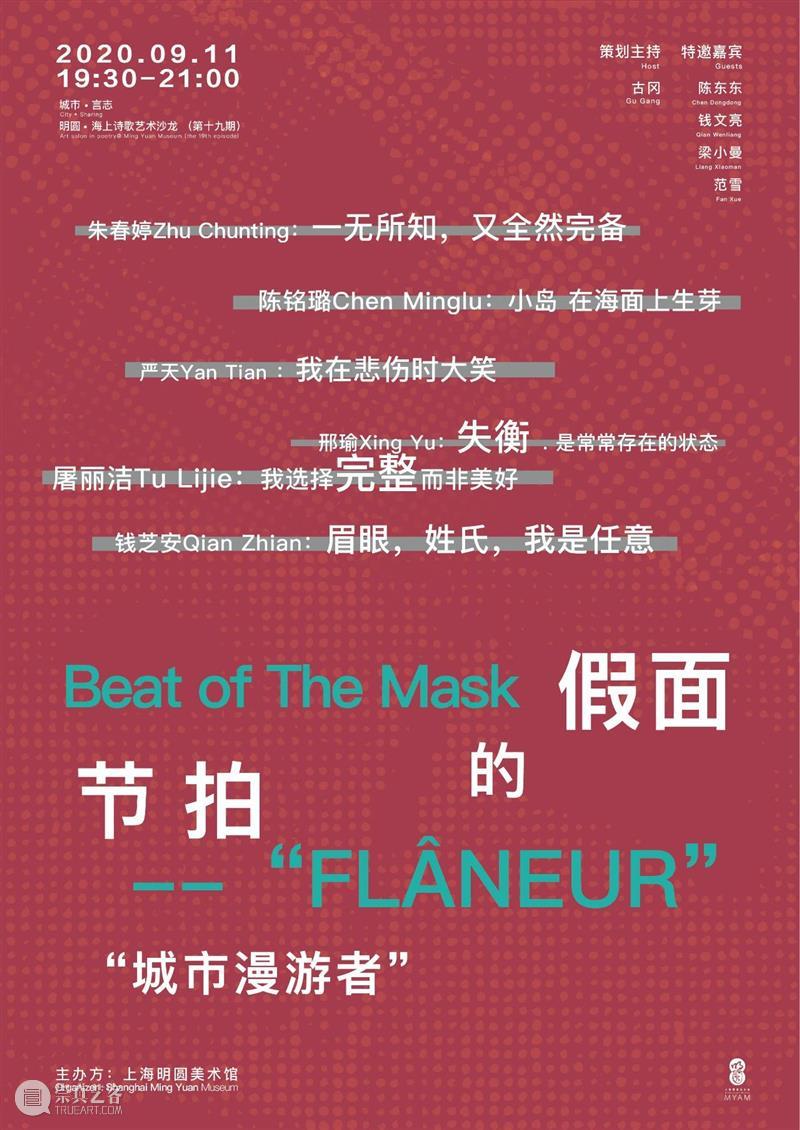
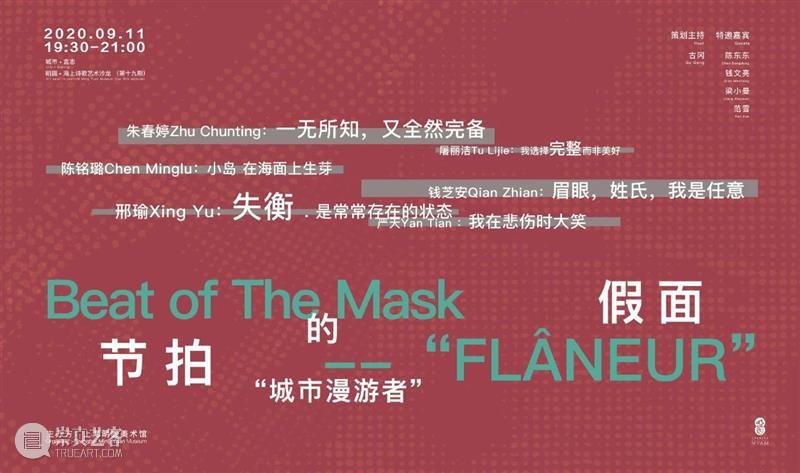
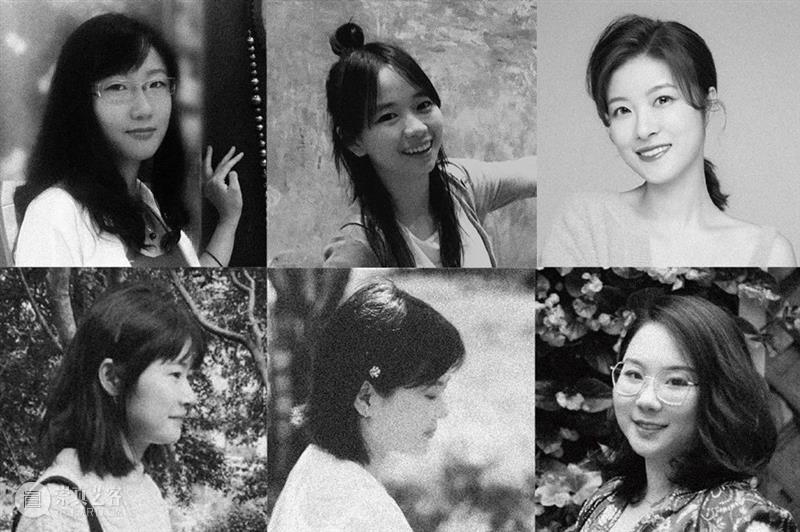
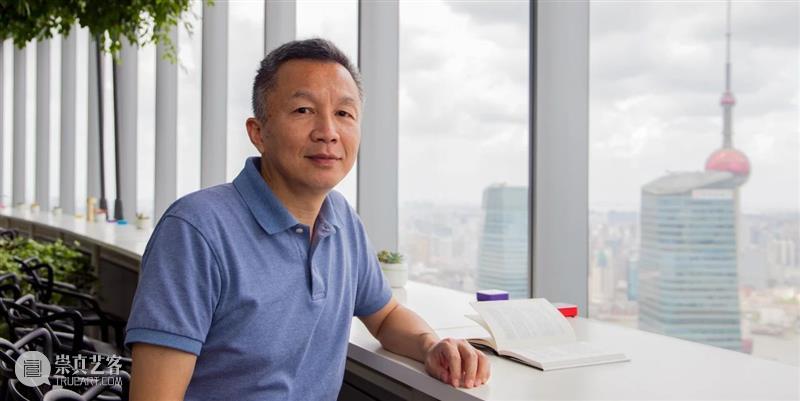
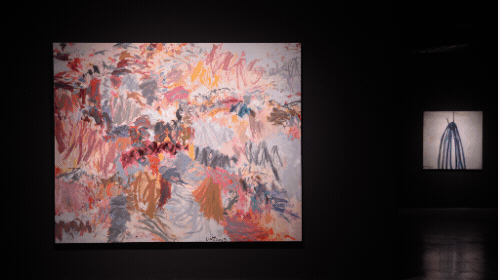
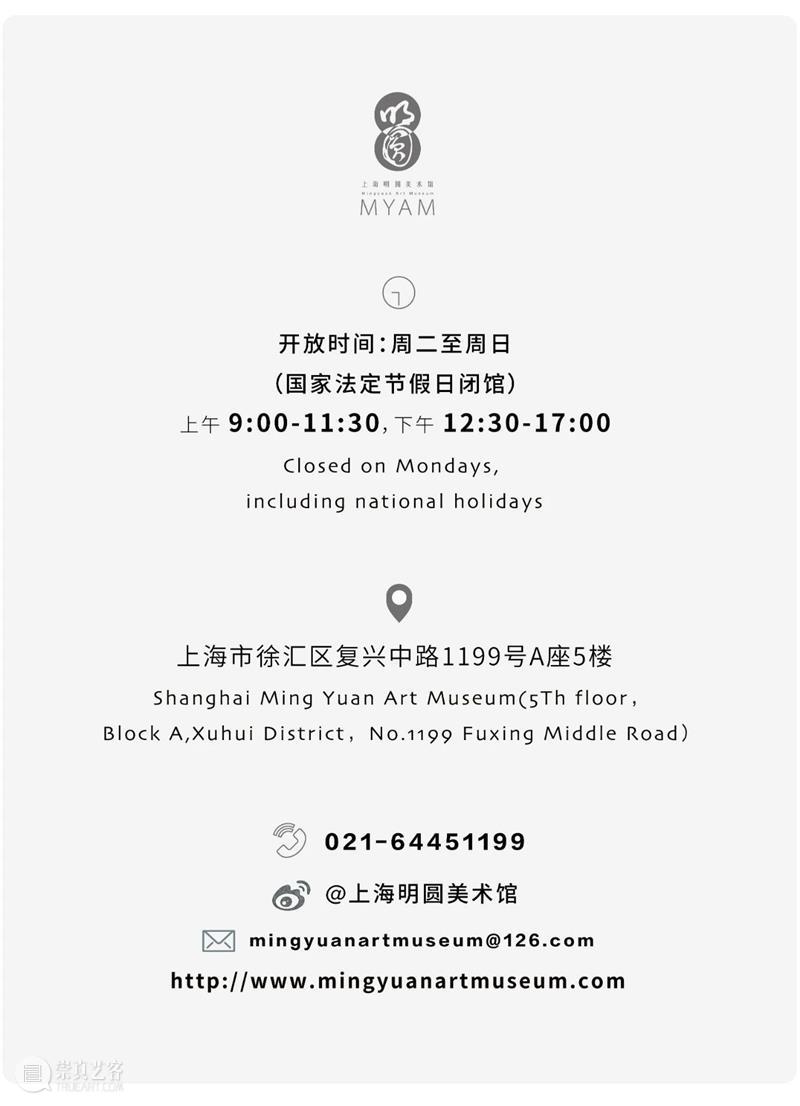







 分享
分享